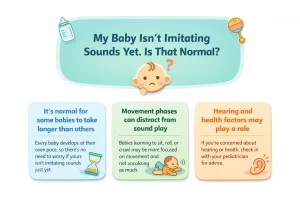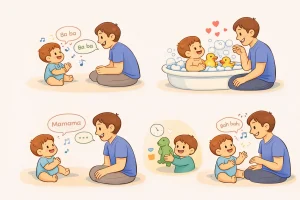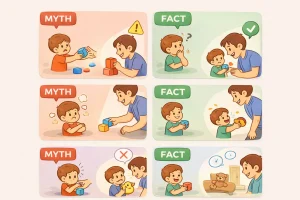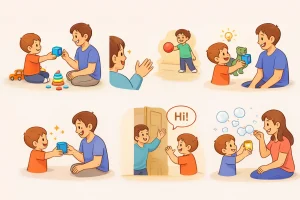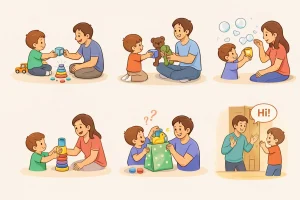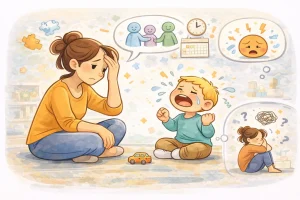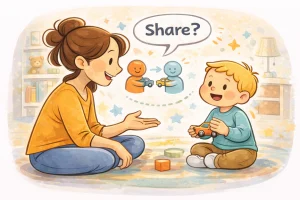Is My Child Just a Late Talker or Showing Signs of a Delay?
By Rajini D
Last Updated: August 4, 2025
If your toddler isn’t talking as much as other kids their age, you’re not alone—and you’re not wrong to wonder why. Some children simply start speaking a little later, while others may be showing early signs of a speech delay. When it comes to late talker vs speech delay, understanding the difference is the first step to getting the right support. In this article, we’ll explore what’s considered normal speech development, red flags to watch for, and practical tips to help your child thrive—plus when it might be time to seek expert guidance. Whether your child needs more time or more help, early awareness makes all the difference.
Free Speech Help for Kids
Concerned about speech delays? Book a free consultation with our expert speech therapist and get guidance tailored to your child’s needs.
What Is a Late Talker?
If your toddler isn’t saying many words yet, you’re not alone—and it’s completely natural to wonder, “Is my child just taking their time, or is something more going on?” A late talker toddler is a child who is developing normally in other areas—like thinking, playing, and motor skills—but isn’t using as many words as expected for their age.
So, what’s “normal” when it comes to talking?
Most children say their first words around 12 months, start combining two words by 18 to 24 months, and may use short phrases by age 2.5 to 3. But every child develops at their own pace. Some children are naturally slow to talk and simply need a little more time.
Typically, a toddler might be considered a late talker if by:
- 18 months, they say fewer than 10 words
- 24 months, they use fewer than 50 words and don’t combine two words like “more juice” or “mama come”
Being a late talker doesn’t always mean something is wrong—but it’s a good reason to start observing more closely.
Understanding Speech Delay in Toddlers
Every child speaks at their own pace—but when your toddler isn’t using as many words as other children their age, it’s natural to feel concerned. A speech delay in toddlers means your child is not reaching expected speaking milestones for their age, even though other areas like thinking or physical movement may be on track.
What Counts as a Speech Delay?
Speech delay refers to difficulty producing sounds, words, or sentences at the expected age. For example, if your toddler:
- Says very few or no words by 18 months
- Doesn’t put two words together by age 2
- Is hard to understand even by familiar adults
…then these may be signs of a speech development delay.
Speech delay is different from being a “late bloomer.” Some kids who are simply slow to talk catch up naturally, while others need a bit of extra support to build their communication skills.
Late Talker vs Speech Delay – What’s the Difference?
It can be confusing to know whether your child is a late talker or showing signs of a speech delay. Here’s a simple comparison to help you understand the difference:
| Feature | Late Talker | Speech Delay |
|---|---|---|
| Uses gestures and understands well | Yes | May struggle with understanding too |
| Other development (motor/play) | On track | May show delays in other areas |
| Tries to communicate non-verbally | Often points, gestures, makes sounds | May not use gestures or show intent to communicate |
| Likely to catch up on their own | In many cases, yes | Often needs speech therapy |
| Age when concern usually noticed | Around 18–24 months | 18 months and beyond |
| Best next step | Monitor closely and encourage speech at home | Speech evaluation recommended |
Signs Your Child May Be Showing a Delay
Every child develops differently, but there are certain speech milestones for toddlers that can help you know if your child is on track. If your toddler is not talking much or seems to be falling behind, it’s worth looking at some age-based red flags. These signs don’t always mean something is wrong—but they are gentle signals that your child might need extra support.
Here’s what to watch for:
By 18 months, your child should:
- Say at least 10 simple words
- Use gestures like pointing, waving, or reaching
- Try to copy sounds or words you sayz
- Red flag: No words at all, very few sounds, doesn’t use gestures
By 2 years, your child should:
- Use around 50 words
- Combine 2 words like “more milk” or “mama go”
- Follow simple instructions like “Get your shoes”
- Red flag: Not combining words, limited vocabulary, hard to understand
By 3 years, your child should:
- Use 3–4 word sentences
- Be understood by family most of the time
- Ask simple questions like “What’s that?”
- Red flag: Doesn’t ask questions, still uses very few words, unclear speech
A communication delay in toddlers can affect both speech (the sounds and words) and language (understanding and using words). If you’re unsure whether your child is just taking their time or needs support, tracking these signs can guide your next step.
When to Worry About Speech Delay
It’s a question many parents ask: When should I worry about speech delay? The truth is, trusting your instincts is important. If you feel something is off—even if others tell you “they’ll talk eventually”—it’s okay to seek guidance early.
Here are some signs that it’s time to take action:
- Your child doesn’t respond to their name by 12 months
- Very limited babbling or sounds by 12–15 months
- No first words by 16–18 months
- No word combinations by 2 years
- Child seems frustrated when trying to communicate
- You or others struggle to understand what your child says after age 2.5
These can all be early signs of a speech development delay, and getting help early can really make a difference. Speech and language therapy is most effective when started early—and many children catch up beautifully with the right support.
Common Reasons for Speech Delay
If your child is not talking as expected, you might be wondering why. The truth is, there are many possible reasons for speech delay, and each child’s journey is unique. Some delays are mild and temporary, while others may need professional attention.
Here’s a simple look at a few common causes:
1. Hearing Issues
Children learn to talk by hearing sounds around them. If your child has trouble hearing clearly—due to frequent ear infections or undiagnosed hearing loss—it can affect how they learn words and sounds. Even mild hearing issues can lead to a language development delay over time.
Tip: If your child doesn’t respond to their name or often seems to “tune out,” it’s a good idea to get their hearing checked.
2. Autism Spectrum Disorder (ASD)
Some children with autism may show early signs through delayed speech, limited eye contact, or a lack of interest in social interaction. Not all children with speech delays have autism—but it’s one reason doctors explore when there’s a wider pattern of communication and behavior differences.
Early screening can help identify if autism may be a factor behind the child not talking, and therapy can begin right away.
3. Too Much Screen Time
Excessive screen exposure—especially passive watching without interaction—can reduce the amount of face-to-face talking a child experiences. This can impact both how they understand and use language. Interactive play and real conversations are key to building strong speech skills.
Try to replace screen time with daily talking, reading, and pretend play.
know more about: Managing Screen Time: Parental Tips for Preventing Virtual Autism
4. Bilingual or Multilingual Homes
Children growing up with more than one language might take a little longer to start speaking, as their brain is processing more information. This is not a problem, but it can sometimes appear like a delay in the early years. Most bilingual children catch up naturally and develop strong language skills in both languages over time.
Just keep talking to your child in your home language—language richness helps, not hurts.
Also read: How Bilingualism Affects Speech Development in Kids
Can Late Talkers Catch Up Without Therapy?
One of the most common questions parents ask is: Can late talkers catch up without therapy? The answer is… sometimes yes, but not always. It really depends on the reason for the delay and how much support the child is getting at home.
Many toddlers who are simply slow to talk (but developing normally in other areas like play, motor skills, and understanding) do eventually catch up—especially with extra talking, reading, and interaction at home.
According to experts, about 50–70% of late talkers catch up to their peers by the time they start school. However, the rest may continue to struggle without some extra help. These children often benefit from early speech therapy, especially if they have signs of a language development delay or difficulty expressing themselves.
So how do you know which group your child might be in?
Here are a few signs that your child may not catch up on their own:
- Very few or no words by 18–24 months
- Doesn’t try to copy sounds or gestures
- Gets frustrated when trying to express themselves
- Doesn’t seem to understand simple instructions
If these sound familiar, don’t wait and hope for the best. Early support can make a huge difference.
Tips to Support Late Talkers at Home
If your child is slow to speak, don’t worry—there’s a lot you can do at home to help! In fact, many parents ask: how to help a toddler talk more? The good news is, simple, everyday moments are the perfect time to build language. You don’t need fancy tools—just your time, attention, and a bit of playfulness.
Here are easy ways to boost toddler speech at home starting today:
1. Talk About Everything You Do
Narrate your day like a story. Say things like, “We’re putting on your shoes,” or “Let’s wash hands now.” Even if your child doesn’t respond yet, they’re learning how language works by hearing it.
2. Read Short Picture Books Daily
Choose simple books with large pictures and few words. Read slowly, point to the pictures, and name what you see. Repetition helps! Your toddler will start to pick up words just by hearing them again and again.
3. Sing Songs and Rhymes
Songs like “Twinkle Twinkle” or “Wheels on the Bus” help with rhythm, memory, and word learning. Add actions or hand movements to make it fun and interactive.
4. Repeat and Expand What Your Child Says
If your child says “car,” you can say, “Yes! A red car!” This shows them how to build longer phrases and keeps the conversation going.
5. Use Playtime to Build Words
Pretend play is a great way to add new words. While playing with animals, you can say, “The cow says moo!” or “Let’s feed the horse.” Keep it fun and light.
6. Pause and Wait
After you speak, pause and give your child time to respond—even if it’s just a sound or a look. Waiting shows them it’s their turn to talk.
Conclusion
If you’re worried about your child’s talking, trust your gut. Some kids just need a little extra time—but others may need speech development support to catch up. The earlier you help, the better the results. Remember, every word counts, and small steps at home can lead to big progress. Don’t wait and wonder—take action today. At Wellness Hub, we’re here to guide you with expert tips, tools, and therapy support.
Frequently Asked Questions:
1. What age is considered a late talker?
A child is usually called a late talker if they are around 18 to 30 months old and don’t say many words, even though they understand well and are developing normally in other areas.
2. How do I know if my toddler has a speech delay?
If your toddler is not talking much, doesn’t use gestures, or has trouble following simple instructions, they may have a speech delay. It’s best to compare with age-based speech milestones for toddlers.
3. Is speech delay the same as being a late talker?
Not always. A late talker may catch up on their own, but a speech delay can mean your child needs speech development support. A speech therapist can help you know the difference.
4. When should I worry about speech delay in my child?
You should consider getting help if your child doesn’t say any words by 18 months, or still isn’t using simple phrases by age 2. Early support can make a big difference.
5. What are some common reasons for speech delay in toddlers?
Some causes include hearing problems, autism, too much screen time, or growing up in a bilingual home. Every child is different, so getting a speech check can help.
6. Can late talkers catch up without therapy?
Some late talkers catch up on their own, but many need help. Studies show that 50–70% of late talkers may not fully catch up without speech therapy or support.
7. Does speech delay mean my child has autism?
Not always. While autism can include speech delay, many children with speech delays do not have autism. Look for other signs like lack of eye contact or limited social play.
8. How can I help my toddler talk more at home?
Talk often, read books, sing songs, and play with your child. These simple daily habits can boost toddler speech at home and build stronger communication skills.
9. Do bilingual children talk later?
Sometimes, yes. Kids growing up in bilingual homes may start talking a bit later, but this is normal and not a delay. They usually catch up with time and support.
10. Where can I get help for my child’s speech delay?
You can reach out to speech therapists or try online programs like Wellness Hub’s Tele-BASICS to get expert guidance, milestone checks, and therapy from home.
About the Author:
Rajini Darugupally
M.Sc., Speech-Language Pathologist (9+ years of experience)
Rajini is a passionate and dedicated Speech-Language Pathologist with over 9+ years of experience, specializing in both developmental speech and language disorders in children and rehabilitation in adults. Driven by a desire to empower each individual to find their voice, Rajini brings a wealth of experience and a warm, genuine approach to therapy. Currently, at Wellness Hub, she thrives in a team environment that values innovation, compassion, and achieving results for their clients.
Book your Free Consultation Today
Parent/Caregiver Info:
Client’s Details:
* Error Message
